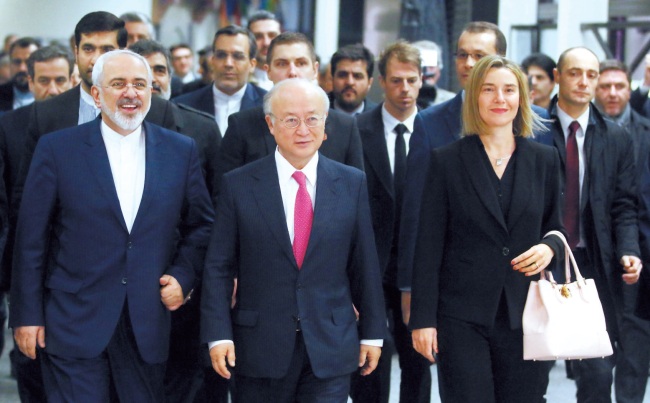As Iran’s comeback to the international community boosts cautious optimism following the lifting of sanctions, North Korea remains the protruding nuclear conundrum for the U.S., but with no way out in the offing.
 |
| Iranian Foreign Minister Mohammad Javad Zarif (left), director general of the International Atomic Energy Agency Yukiya Amano (center) of Japan and European Union high representative Federica Mogherini (right), arrive at the IAEA in Vienna, Austria, on Saturday. (AP-Yonhap) |
Seoul, Washington and other actors have been mounting calls on Pyongyang to follow in the footsteps of Tehran since the Islamic republic clinched a watershed nuclear accord last year with the “P5 1” — the U.S., the U.K., China, France and Russia, plus Germany.
Yet the communist state has shown little willingness to forsake its nuclear program and return to denuclearization dialogue, in favor of arms reduction talks, while inexorably staging experiments of various types of fission devices and their launch vehicles.
The U.S. and China, the two top stakeholders in the issue alongside South Korea, also seem to have remained lukewarm about crafting a new gesture that may break the protracted deadlock and set the talks back into motion.
“We now have unfortunately a decade during which North Korea has totally reversed its obligations to the international community, when it comes to missile and nuclear programs,” U.S. Deputy Secretary of State Antony Blinken said at a news conference in Tokyo on Saturday following a meeting with his South Korean and Japanese vice foreign ministers.
“So it‘s very hard to take any of their overtures very seriously, particularly in the wake of their fourth nuclear test.”
The prevailing skepticism toward any engagement with the regime came in response to the North’s offer last Friday to halt nuclear tests in exchange for a freeze in South Korea-U.S. joint military drills and an opening of talks on the establishment of a peace treaty.
Pyongyang’s Foreign Ministry said via state media that the country will not “recklessly” use or transfer atomic bombs or related technologies, while continuing to beef up its nuclear deterrence against Washington, demanding the U.S. acknowledge the North as a nuclear weapons state and stop the ongoing sanctions move.
“What made that agreement (with Tehran) possible was the decision by Iran to freeze, and in some respects roll back, its nuclear program, in order to allow time and space to see if we could negotiate a comprehensive agreement,” Blinken added.
The Kim Jong-un regime is coming under ever-mounting pressure now that Iran, its onetime partner in covert arms trade and nuclear and missile development, is free from crippling international sanctions after Sunday’s (Korea time) formal announcement.
It will likely become the sole nation for which the U.N. operates a sanctions panel, as that on Iran is expected to dismantle in line with the lifting. With the U.N. Security Council is working on a new resolution over Pyongyang’s fourth underground blast, the Iran case may well encourage member countries to harden their lines against the unruly regime.
Cautious optimism is reemerging that driven by recent breakthroughs with Iran and Cuba, U.S. President Barack Obama could approach the North afresh in a bid to consolidate his foreign policy legacy. Shortly before taking office in 2009, he said he was willing to reconcile with the three countries, and during a 2007 debate said it was “ridiculous” to think that “somehow not talking to countries is punishment to them, which has been the guiding diplomatic principle of (the former President George W. Bush) administration.”
With less than a year to go until the next presidential election, however, the Obama administration is unlikely to invest — or risk — much of its diplomatic energy in the North Korean nuclear issue, observers say. Pyongyang’s poor track record of keeping past pledges could mean that a lasting settlement would be more difficult and the possibilities of after-deal backlash much higher.
In the wake of the fourth nuclear test, the U.S. and China are again seen walking similar paths that start with criticism of the Kim regime and a war of nerves over a UNSC resolution that would lead to a compromise.
The pattern, or what critics call a vicious cycle, has since rekindled criticism at home and in Seoul and calls for a revamp of Obama’s “strategic patience” strategy. Yet Washington remains steadfast in its action-first principle, blaming Pyongyang’s failure to follow through on previous commitments, as indicated by Blinken.
“Compared with Iran, the North Korean case is far more convoluted — in terms of the economic structure and diplomatic manner, it would be easier to mount pressure on and strike a bargain with Iran, whose nuclear program is also not as advanced as that of the North,” a diplomatic source in Seoul said, requesting anonymity due to the sensitivity of the matter.
“Knowing that Kim Jong-un will not abandon nuclear weapons most likely, and having built sufficient legacies such as with Iran and Cuba, Obama seems to have little reason or incentive to initiate negotiations with North Korea at a time when he is already occupied with the election season and the Middle East.”
By Shin Hyon-hee (heeshin@heraldcorp.com)

